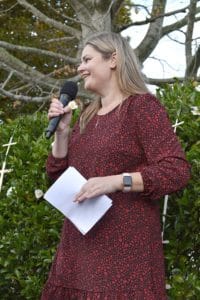by MINA AMSO
This year might be the last year prayerful gatherings outside abortion facilities could legally take place if MP Louisa Wall’s “safe areas” bill is passed by Parliament.
Some 50 people gathered outside Greenlane Hospital by the curbside of the Epsom Day [abortion] clinic in Auckland, on a Saturday afternoon (June 19), in remembrance of the babies lost to abortion.

Kate Cormack speaks at the Auckland gathering.
Voice for Life president Kate Cormack said she was pleased at how the gathering went.
“I am encouraged, I am really thankful. I am glad we could be here and stand in peace. It just feels that we were able to respectfully remember these children.”
The gathering coincides with a significant bill that, if passed, could mean gatherings like this are problematic.
The Contraception, Sterilisation, and Abortion (Safe Areas) Amendment Bill was introduced to Parliament in July last year. The bill had its first reading in March this year, and is now being looked at by a parliamentary select committee.
The bill sets out to enforce, on a case-by-case basis, a 150-metre so-called “safe area” around medical facilities where abortions are being carried out, and could well prevent groups gathering to pray or hold vigils in that zone. That is if it decided that such prayer and vigils constitute communication with “protected persons” that would reasonably be seen as causing emotional distress for that person.
Ms Cormack said people “don’t understand” that the bill would mean a vigil will become a crime, where people could be arrested, charged, and fined $1000.
The bill aims to stop people harassing, intimidating and abusing women accessing the premises. Pro-life groups say they don’t do this.
Ms Cormack told the Auckland gathering this bill is a way to “silence” Voice for Life.
“We will find creative ways to still reach out to women and we will challenge if the law is passed. We are really facing one of the most extreme and radical abortion laws that came into place last year. I truly believe I was born for such a time as this. And I am really determined we will only increase our effort to continue to fight even harder now that the [abortion] law has passed. So, it doesn’t discourage us at all,” Ms Cormack said.
A minute of silence was observed and crosses were laid in memory of every unborn child whose life ended by abortion over the last year. More abortions took place in 2020 in New Zealand [13,236 babies], as against 2019 [12,857]. The annual “Unborn Remembrance Day” vigil in Auckland was held in unison with 15 other vigils in cities and towns across the country.
Former Voice for Life president Bernard Moran said the June 19 gathering was a worthwhile effort.
“I think we all drew encouragement and support. You’re not alone, it’s not just two or three of you, there’s more people support.”
Mangere Bridge couple Denise and Daniel Erasmus, who attended the event, said every baby conceived has a right to live.
“If the parent doesn’t want the baby, they are entitled to give it to somebody who would look after it and bring it up and love it and care for it”.
In a submission to the select committee earlier this month, Auckland diocese Justice and Peace Commission Human Life Committee convener Catherine Gillies, who’s been a post-abortion counsellor for over 30 years, said this bill should be opposed.
“We believe the bill as proposed is unnecessary, as any difficulties that could arise are well covered by present legislation such as the Summary Offences Act. This is supported by the 2018 Law Commission process, which advised that such ‘safe areas’ were not warranted in New Zealand.”
She touched on the bill’s likely breach of human rights law with regards to lawful assembly, saying that it could lead to “unintended consequences for other peaceful gatherings”.
In their submission, the Royal Australian and New Zealand College of Obstetricians and Gynecologists backed the bill, and recommended two revisions be made; one that allows automatic establishment of safe areas around the country rather than a case-by-case basis; and an expansion of protection to include support people and others visiting a service where abortions are provided.
Mrs Gillies described the bill as an overreach, and said all legislation should be respectful of human dignity, noting that the introduction of safe areas would disregard the dignity “to the protected person or to those gathered to pray”. She argued that this bill is being made contrary to the reality of the New Zealand environment.
Ms Cormack, the youngest-ever president for Voice for Life, said the bill might cause pro-lifers to be afraid.
“So people may be afraid to come because the law is going to be so ambiguous and general that people won’t actually understand what is legal and what is illegal. So many people won’t pray. I could be wearing a prolife t-shirt for all I know and be charged, and I may not know I am within a so called safe-zone,” Ms Cormack said.
This bill is a government bill posing as a Private Members bill as it promotes government policy that was included in the Abortion Legislation Act but was lost due to mismanagement in Parliament. This bill threatens the right of free speech, assembly, communication and religion. Why are the Churches silent in failing to defend our human rights. If it becomes unlawful to pray within 150 metres of an abortion facility the government could then decide that it is offensive and unlawful for anyone to pray outside of their Church. This bill is farcical in seeking to address a problem that does not exist. It is a distraction from the real violence inflicted on women and their unborn inside the killing centre. The government seeks to control what we think, what we say and what we do.